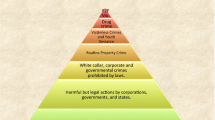Abstract
This paper returns to the question of how to think of justice through Teubner’s recent definition of what he calls juridical justice. Juridical justice is defined as distinct from political, moral, social and theological conceptions of justice. Teubner attempts to think of an imaginary space for a juridical justice ‘beyond the sites of natural and positive law’ and searches for a conception of justice as the ‘law’s self-subversive principle’. This article reviews Teubner’s conception of juridical justice and further proposes a distinction between juridical and non-juridical understandings of justice.
Similar content being viewed by others
Notes
See also for Teubner’s comments on Rabbi Eliezer’s halachic discussion.
Teubner calls this juridification: ‘justicialization of the world’ at pp. 21–22.
See, for example, Teubner’s discussion of Rudolf Wiethölter’s attempt, in Teubner (2006, pp. 41–64).
See Nancy (2003, pp. 152–171). A manner of thinking thought as judgment that is fundamental to both legal and philosophical reason.
Gewalt is difficult to translate since it represents both the role of authority and the application of violence.
See for the correction of the translation of the term Auslösung that which triggers rather than as Auflösung (that which dissolves), Agamben (2007, p. 125).
As suggested earlier, juridical conceptions of justice are not exclusively confined to those of a legal system but include all conceptions of justice that operate under the paradigm of the juridical, of judgment.
Ethics is understood here in the sense of ethos meaning a way of being.
Paraphrasing Agamben (1995, p. 84).
Scholem quoted in Jacobson (2003, n. 52, p. 177).
References
Abbott, Matthew. 2008. The creature before the law: Notes on Walter Benjamin`s Critique of Violence, in the online journal Colloquy: Text Theory Critique, 16, at http://www.colloquy.monash.edu.au/issue016/issue16.pdf.
Agamben, Giorgio. 1995. Idea of prose (trans. Michael Sullivan and Sam Whitsitt), Albany: State University of New York Press.
Agamben, Giorgio. 1998. Homo Sacer: Sovereign power and bare life (trans. Daniel Heeler-Roazen). Stanford, California: Stanford University Press.
Agamben, Giorgio. 1999a. The man without content (trans. Georgia Albert). Stanford, California: Stanford University Press.
Agamben, Giorgio. 1999b Potentialities (trans. Daniel Heller-Roazen). Stanford: Stanford University Press: Part I.
Agamben, Giorgio. 2005. The time that remains: A commentary on the Letter to the Romans (trans. Patricia Dailey). Stanford California: Stanford University Press.
Agamben, Giorgio. 2007. Il regno e la gloria. Per una genealogia teologica dell’economia e del governo. Homo sacer, vol. 2/2. Milan: Neri Pozza.
Benjamin, Walter. 1978. Critique of violence. In Reflections, essays, aphorisms, autobiographical writings, ed. Peter Demetz (trans. Edmund Jephcott). New York: Harcourt.
Benjamin, Walter. 1995. Notes to a study on the category of justice (Notizen zu einer Arbeit über die Kategorie der Gerechtigkeit), in Gershom Scholem, Tagebücher, nebst Aufsätzen und Entwürfen bis 1923. Vol. 1/1, 1913–1917, ed. Karlfried Gründer and Friedrich Niewöhner. Frankfurt: Jüdischer Verlag.
Derrida, Jacques. 1982. Différance. Margins of philosophy (trans. Alan Bass). Chicago: University of Chicago Press.
Derrida, Jacques. 1993. Spectres de Marx—l’état de la dette, le travail du deuil et la nouvelle Internationale. Paris: Galilée.
Derrida, Jacques. 2002. Force of law: ‘The mystical foundation of authority’. In Acts of religion, ed. Gil Anidjar. Routledge: New York.
Fenves, Peter. 1996. The genesis of judgment: spatiality, analogy and metaphor in Benjamin’s ‘On language as such and on human language’. In Walter Benjamin–theoretical questions, ed. S. David. Ferris, Stanford, California: Stanford University Press.
Heidegger, Martin. 1957. Holzwege. Frankfurt: Vittorio Klostermann.
Heidegger, Martin. 1975. The Anaximander Fragment, in Heidegger, Martin. In Early Greek thinking (trans. David Farrell Krell and Frank Capuzzi). New York: Harper and Row.
Jacobson, Eric (trans). 2003. Metaphysics of the profane: The political theology of Walter Benjamin and Gershom Scholem, New York: Columbia University Press.
Luhmann, Niklas. 1995. Social systems. Stanford: Stanford University Press.
Nancy, Jean-Luc. 2003. A finite thinking. Stanford: Stanford University Press.
Schütz, Anton. 1997. The twilight of the global polis: On losing paradigms, environing systems, and observing world society. In Global law without a State, ed. Gunther Teubner. Dartmouth: Aldershot.
Schütz, Anton. 2000. Thinking the law with and against Luhmann, Legendre, Agamben. Law and Critique 11/2: 123.
Schütz, Anton. 2005. Legal critique: Elements for a genealogy. Law and Critique 16: 71–93.
Teubner, Gunther. 1989. How the law thinks: Toward a constructivist epistemology of law. Law and Society Review 23: 740.
Teubner, Gunther. 1997. The king’s many bodies: The self-deconstruction of law’s hierarchy. Law & Society Review 31(4): 763–786.
Teubner, Gunther. 1990. ‘And God laughed…’: Indeterminacy, self-reference, and paradox in law. Stanford Literature Review 7(1–2): 15–51.
Teubner, Gunther. 2001a. Alienating justice: On the social surplus value of the twelfth camel, in Law’s new boundaries: Consequences of legal autopoiesis, ed. David Nelken and Jirí Pribán, Aldershot: Ashgate.
Teubner, Gunther. 2001b. Economics of gift-positivity of justice: The mutual paranoia of Jacques Derrida and Niklas Luhmann. Theory, Culture and Society 18: 29.
Teubner, Gunther. 2006. Dealing with paradoxes of law: Derrida, Luhmann, Wiethölter (Storrs Lectures 2003/04, Yale Law School). In On paradoxes, inconsistencies in law, ed. Oren Perez and Gunther Teubner. Hart: Oxford.
Teubner, Gunther. 2009. Self-subversive justice: Contingency or transcendence formula of law? Modern Law Review 72: 1–23.
Vismann, Cornelia. 1992. Das Gesetz ‘DER Dekonstruktion’. Rechtshistorisches Journal 11: 250–264.
Author information
Authors and Affiliations
Corresponding author
Additional information
Article dedicated for Cornelia Vismann.
Rights and permissions
About this article
Cite this article
Zartaloudis, T. On Justice. Law Critique 22, 135–153 (2011). https://doi.org/10.1007/s10978-011-9086-1
Published:
Issue Date:
DOI: https://doi.org/10.1007/s10978-011-9086-1



